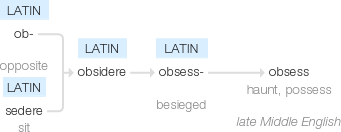Obsess
late Middle English (in the sense ‘haunt, possess’, referring to an evil spirit): from Latin obsess- ‘besieged’, from the verb obsidere, from ob- ‘opposite’ + sedere ‘sit’. The current sense dates from the late 19th century.
wiktionary
From Latin obsessus, perfect passive participle of obsideō(“sit on or in, remain, besiege”), from ob(“before”) + sedeō(“I sit”); see sit, session, etc.; compare assess, possess.
etymonline
obsess (v.)
c. 1500, "to besiege" (a sense now obsolete), from Latin obsessus, past participle of obsidere "watch closely; besiege, occupy; stay, remain, abide" literally "sit opposite to," from ob "against" (see ob-) + sedere "to sit," from PIE root *sed- (1) "to sit." Of evil spirits, "to haunt," from 1530s. The psychological senseof "to haunt as a fixed idea" developed gradually from 1880s and emerged 20c. The 1895 Century Dictionary has only the two senses "to besiege" (marked obsolete) and "to attack, vex, or plague from without." Related: Obsessed; obsessing.
